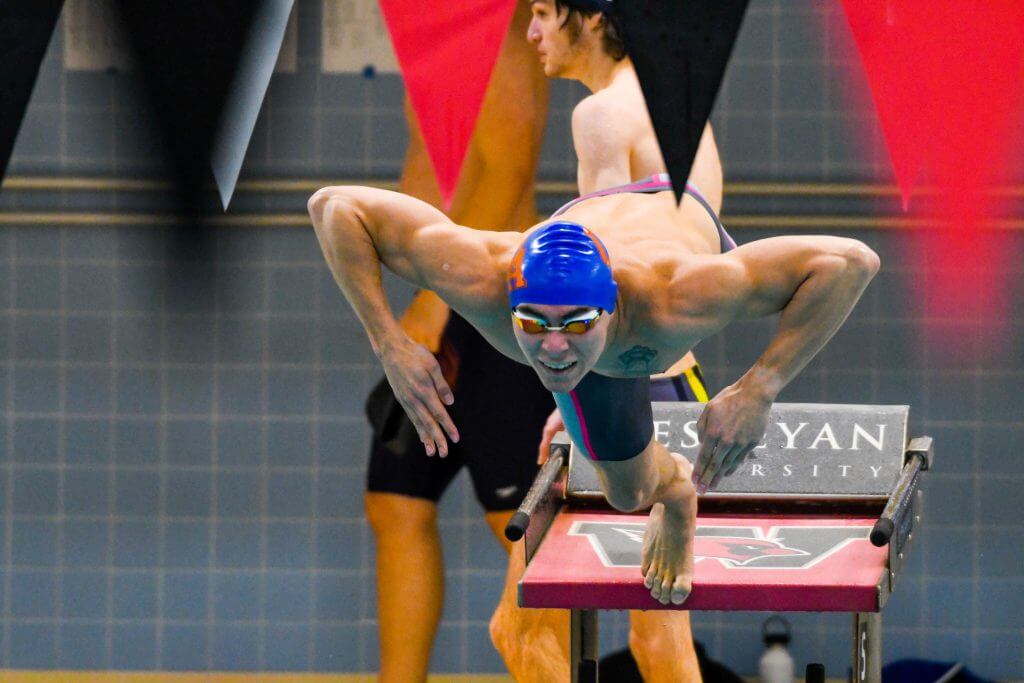In Service of Swimming Dream, Coast Guard Academy’s Joe Rodriguez Making History

If you’re a little surprised to see Joe Rodriguez representing the Coast Guard Academy on the podium of the NCAA Division III Championships or at Olympic Trials, the senior doesn’t mind. He’s occasionally in awe of how far the swimming journey has taken him, too.
Rodriguez, a native of Atlanta, wasn’t a swimmer until his junior year of high school. His athletic Plan A, lacrosse, went out the window when he tore his ACL, a recovery made more arduous by complications with the growth plates in his leg. So to fuel his competitive fire, and not risk further contact-sports injuries that could derail his military aspirations, Rodriguez turned to the pool, trading midfield runs for morning practices.
Within six years, it’s brought him places that most swimmers only dream of.
“I don’t know if I would’ve believed that” swimming would take him this far, Rodriguez said last week. And, military paperwork permitting, it should take him all the way to Omaha this summer.
Before the cancellation of the NCAA Division III Championships, Rodriguez was seeded fourth in the 50-yard freestyle at a seed time of 20.04 seconds. He was third in the event last year in 19.88, a school record. Coast Guard was also seeded 13th in the 200 free relay.
He had finished seventh in the 100 free last year but recorded the 28th fastest-time in DIII. Likewise, Coast Guard narrowly missed the cut in the 400 free (18th), 200 medley (19th), 400 medley (21st), and 800 free relays (22nd).
The sprinter has rewritten the record books at the Coast Guard Academy, setting school records in the 50 and 100 free and as part of four relays. He started with a NEWMAC championship as a sophomore and honorable mention All-American honors in the 50 free while finishing 16th. His ascent continued as a junior, finishing third in the 50 free and seventh in the 100 at NCAAs as well as swimming on three NCAA relays.
Though he wasn’t a high-level prospect arriving at the Academy, the training has complemented a natural competitiveness that has led to success.
“Academy kids typically are pretty self-motivated,” coach John Westkott said. “If they swim all four years, they’ve got to love it because there’s so many other distractions over their four-year period, and swimming tends to be the break in their day. To see him want to fall into the sport fully, initially it was kind of a wait-and-see-what-happens. Now, whatever we put in front of him, he achieves it.”
But as stunning as being a regular sub-20 50-freestyler has been, the most impressive first might have come in long-course at, of all places, the United States Naval Academy in December when Rodriguez went 23.07 in the 50-meter free. With that swim, he became the first Coast Guard Academy swimmer to qualify for Olympic Trials, an honor he wears with pride.
“Most of that comes from the academy mindset of serving my country,” Rodriguez said. “Certainly it is an honor to compete and represent my school, especially as a small school. But I see this as a stepping stone for me into my adult life to go from competing for the Coast Guard Academy to serving.”
Rodriguez is the first Trials swimmer Westkott has coached anywhere, including in the last 21 years at the Coast Guard Academy. There’s a mix of personal and professional satisfaction in that.
“From a personal side, as a swimming coach, it’s pretty neat to be a part of it,” Westkott said. “But I think programmatically, it’s pretty special to be involved with the first guy to go, especially because he comes from relatively humble beginnings. He wasn’t by any stretch a highly prized recruit. He was good for us, but not one of your prototypical Olympic Trials-level kids out of high school.”
His path to Olympic Trials was cleared last week when he found out his first posting, stationed on a national security cutter out of the Coast Guard base in Alameda, Calif., one of the electrical engineering major’s top choices. When he qualified in December, there was some question as to whether he’d get the leave required to attend trials.
But his swim has generated enough buzz that Rodriguez felt confident the Academy would do whatever it could to help him get to Omaha. Prior to changes made by COVID-19, Graduation was scheduled for May 20, and cadets typically get around 30 days of leave before their first posting. With the 50 free in Omaha to be swum June 27, it won’t take a lot to get Rodriguez there.
“The support within the academy community has been pretty neat,” Westkott said. “We’re getting people in the stands that sometimes wouldn’t wander down the hill. It’s a pretty close-knit community, but we probably have a little more viability because of what Joe has done. He’s kind of culminating a couple-year upswing of the program.”
In the meantime, he’ll have the chance to train at the Academy.
“I think it’ll definitely feel more real after NCAAs,” he said. “We’ve slowly whittled down our group here from the main training group to the group for conferences, then from conferences to NCAAs. I think once I’m the only person left still swimming, then it’s going to hit pretty hard. To be the first person from the Coast Guard Academy, it’s really cool and a really neat opportunity. It’s something that even people from other colleges don’t get to do, to swim on and compete past where they would normally have their college season end and I get to do that. It’s a really neat and unique experience to have.”



